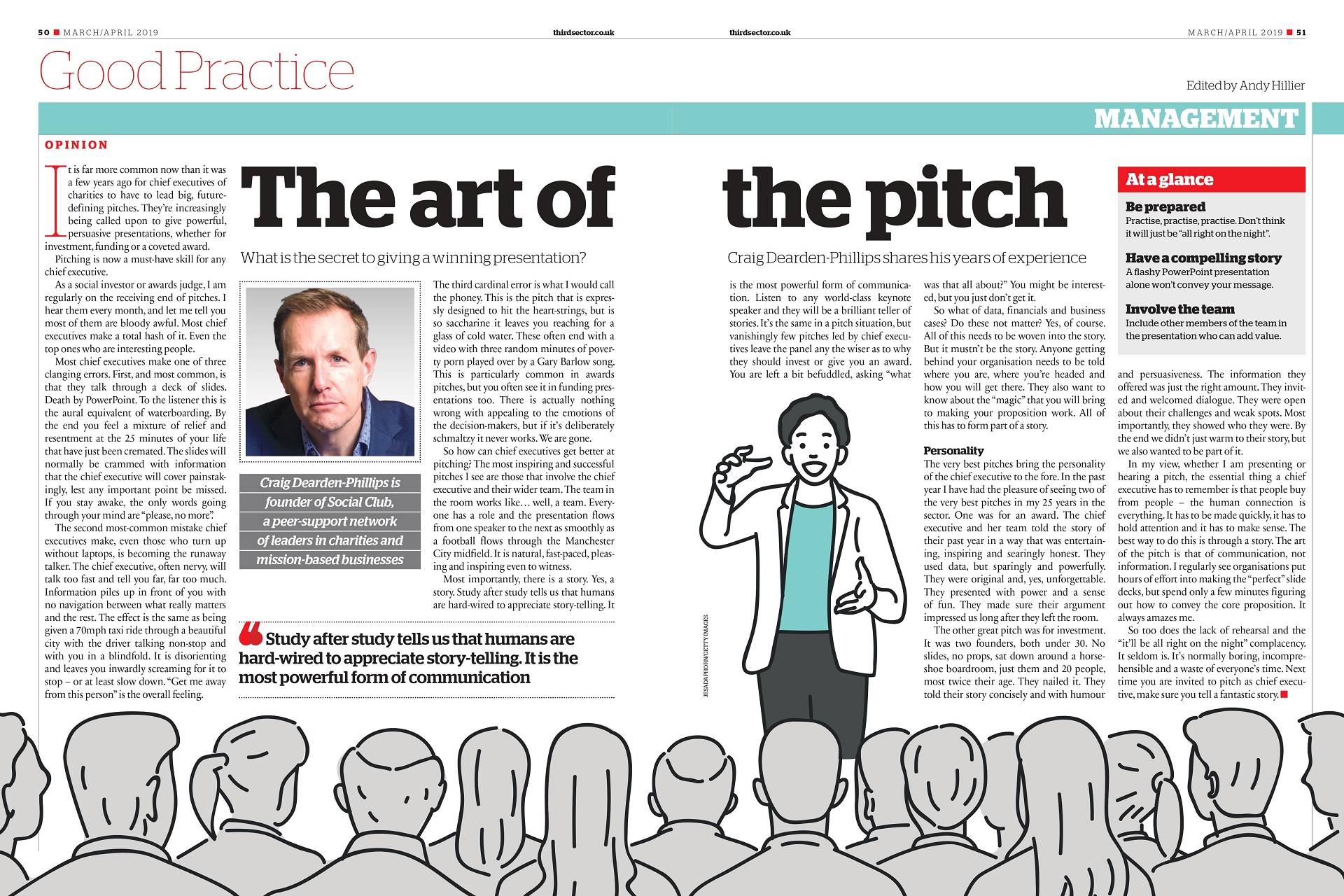AT A GLANCE
BE PREPARED
Practise, practice, practise. Don’t think it will just be “all right on the night”.
HAVE A COMPELLING STORY
A flashy PowerPoint presentation alone won’t convey your message.
INVOLVE THE TEAM
Include other members of the team in the presentation who can add value.
What is the secret to giving a winning presentation? Craig Dearden-Phillips shares his years of experience
It is far more common now than it was a few years ago for chief executives of charities to have to lead big, future- defining pitches. They’re increasingly being called upon to give powerful, persuasive presentations, whether for investment, funding or a coveted award.
Pitching is now a must-have skill for any chief executive.
As a social investor or awards judge, I am regularly on the receiving end of pitches. I hear them every month, and let me tell you most of them are bloody awful. Most chief executives make a total hash of it. Even the top ones who are interesting people.
Most chief executives make one of three clanging errors. First, and most common, is that they talk through a deck of slides. Death by PowerPoint. To the listener this is the aural equivalent of waterboarding. By the end you feel a mixture of relief and resentment at the 25 minutes of your life that have just been cremated. The slides will normally be crammed with information that the chief executive will cover painstakingly, lest any important point be missed. If you stay awake, the only words going through your mind are “please, no more”.
The second most-common mistake chief executives make, even those who turn up without laptops, is becoming the runaway talker. The chief executive, often nervy, will talk too fast and tell you far, far too much. Information piles up in front of you with no navigation between what really matters and the rest. The effect is the same as being given a 70mph taxi ride through a beautiful city with the driver talking non-stop and with you in a blindfold. It is disorienting and leaves you inwardly screaming for it to stop – or at least slow down. “Get me away from this person” is the overall feeling.
The third cardinal error is what I would call the phoney. This is the pitch that is expressly designed to hit the heart-strings, but is so saccharine it leaves you reaching for a glass of cold water. These often end with a video with three random minutes of poverty porn played over by a Gary Barlow song. This is particularly common in awards pitches, but you often see it in funding presentations too. There is actually nothing wrong with appealing to the emotions of the decision-makers, but if it’s deliberately schmaltzy it never works. We are gone. So how can chief executives get better at pitching? The most inspiring and successful pitches I see are those that involve the chief executive and their wider team. The team in the room works like… well, a team. Everyone has a role and the presentation flows from one speaker to the next as smoothly as a football flows through the Manchester City midfield. It is natural, fast-paced, pleasing and inspiring even to witness. Most importantly, there is a story. Yes, a story. Study after study tells us that humans are hard-wired to appreciate story-telling.
“Study after study tells us that humans are hard-wired to appreciate story-telling. It is the most powerful form of communication”
It is the most powerful form of communication. Listen to any world-class keynote speaker and they will be a brilliant teller of stories. It’s the same in a pitch situation, but vanishingly few pitches led by chief executives leave the panel any the wiser as to why they should invest or give you an award. You are left a bit befuddled, asking “what was that all about?” You might be interested, but you just don’t get it.
So what of data, financials and business cases? Do these not matter? Yes, of course. All of this needs to be woven into the story. But it mustn’t be the story. Anyone getting behind your organisation needs to be told where you are, where you’re headed and how you will get there. They also want to know about the “magic” that you will bring to making your proposition work. All of this has to form part of a story.
PERSONALITY
The very best pitches bring the personality of the chief executive to the fore. In the past year I have had the pleasure of seeing two of the very best pitches in my 25 years in the sector. One was for an award. The chief executive and her team told the story of their past year in a way that was entertaining, inspiring and searingly honest. They used data, but sparingly and powerfully. They were original and, yes, unforgettable. They presented with power and a sense of fun. They made sure their argument impressed us long after they left the room.
The other great pitch was for investment. It was two founders, both under 30. No slides, no props, sat down around a horseshoe boardroom, just them and 20 people, most twice their age. They nailed it. They told their story concisely and with humour and persuasiveness. The information they offered was just the right amount. They invited and welcomed dialogue. They were open about their challenges and weak spots. Most importantly, they showed who they were. By the end we didn’t just warm to their story, but we also wanted to be part of it.
In my view, whether I am presenting or hearing a pitch, the essential thing a chief executive has to remember is that people buy from people – the human connection is every thing. It has to be made quickly, it has to hold attention and it has to make sense. The best way to do this is through a story. The art of the pitch is that of communication, not information. I regularly see organisations put hours of effort into making the “perfect” slide decks, but spend only a few minutes figuring out how to convey the core proposition. It always amazes me.
So too does the lack of rehearsal and the “it’ll be all right on the night” complacency. It seldom is. It’s normally boring, incomprehensible and a waste of everyone’s time. Next time you are invited to pitch as chief executive, make sure you tell a fantastic story

Craig Dearden-Phillips is founder of Social Club, a peer-support network of leaders in charities and mission-based businesses
The Article


Recent Comments